
-
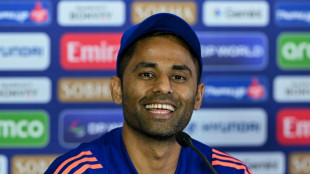 Suryakumar says India v Pakistan 'not just another game'
Suryakumar says India v Pakistan 'not just another game'
-
Brook hails 'brilliant' Banton as England back on track at T20 World Cup

-
 Brazilian Olympic champion Braathen is his own man - and Norway's loss
Brazilian Olympic champion Braathen is his own man - and Norway's loss
-
About 200,000 join Iran demonstration in Munich: police

-
 Where did it all go wrong for 'Quad God' Malinin?
Where did it all go wrong for 'Quad God' Malinin?
-
Brazil's Braathen wins South America's first ever Winter Olympic gold

-
 Banton powers England to victory over Scotland at T20 World Cup
Banton powers England to victory over Scotland at T20 World Cup
-
Zelensky says all Ukrainian power plants damaged, calls Putin 'slave to war'
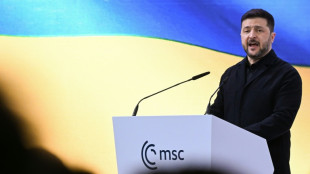
-
 Palestinian leader urges removal of all Israeli 'obstacles' on Gaza ceasefire
Palestinian leader urges removal of all Israeli 'obstacles' on Gaza ceasefire
-
Igor Tudor hired as Tottenham interim manager
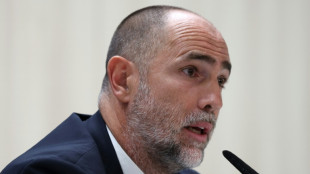
-
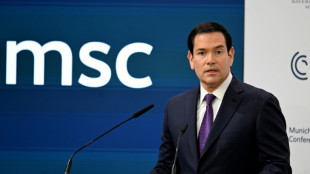 Rubio tells Europe to join Trump's fight, says it belongs with US
Rubio tells Europe to join Trump's fight, says it belongs with US
-
Winter Olympians have used 10,000 condoms

-
 Weston's skeleton Olympic gold a triumph over adversity
Weston's skeleton Olympic gold a triumph over adversity
-
England bowl Scotland out for 152 in T20 World Cup

-
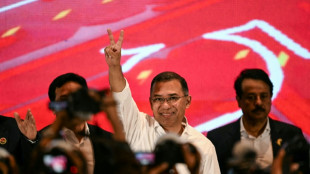 Bangladesh PM-to-be Rahman thanks those who 'sacrificed for democracy'
Bangladesh PM-to-be Rahman thanks those who 'sacrificed for democracy'
-
Sabalenka, Swiatek withdraw from WTA 1000 event in Dubai

-
 Brazil's Braathen in pole for historic Olympic giant slalom medal
Brazil's Braathen in pole for historic Olympic giant slalom medal
-
Top entertainment figures back under-fire UN Palestinians expert
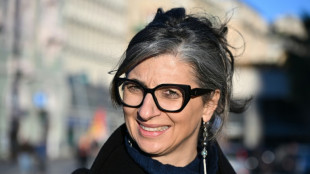
-
 Pakistan 'always ready' for India despite late green light: Agha
Pakistan 'always ready' for India despite late green light: Agha
-
Rubio tells Europe it belongs with US, calls it to join Trump's fight
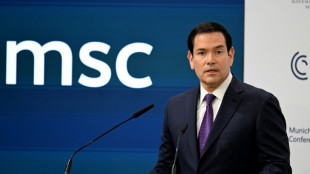
-
 Tucker stars as Ireland crush Oman by 96 runs at T20 World Cup
Tucker stars as Ireland crush Oman by 96 runs at T20 World Cup
-
Rubio tells allies US and Europe 'belong together'
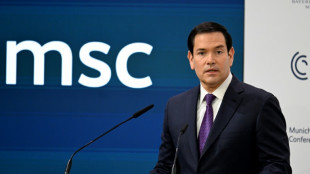
-
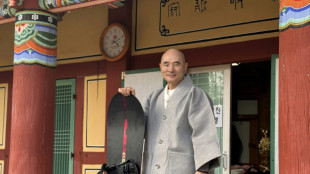 Snowboarding monk in spotlight after S. Korea's Olympic glory
Snowboarding monk in spotlight after S. Korea's Olympic glory
-
Bangladesh's Tarique Rahman poised to be PM as Islamists concede
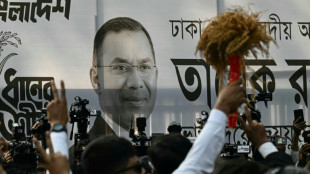
-
 What does Greenland's mining industry look like?
What does Greenland's mining industry look like?
-
Greenland prepares next generation for mining future

-
 China top court says drivers responsible despite autonomous technology
China top court says drivers responsible despite autonomous technology
-
Sixers rookie Edgecombe leads 'Team Vince' to NBA Rising Stars crown

-
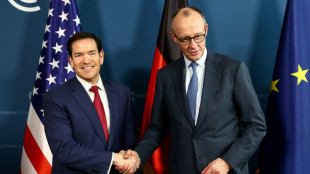 Rubio at Munich security meet to address Europeans rattled by Trump
Rubio at Munich security meet to address Europeans rattled by Trump
-
Medal-winner Sato says Malinin paid for 'toxic schedule'

-
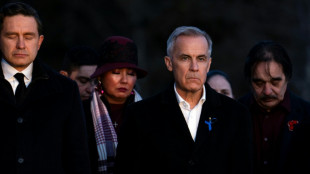 Carney offers support of united Canada to town devastated by mass shooting
Carney offers support of united Canada to town devastated by mass shooting
-
All-in on AI: what TikTok creator ByteDance did next

-
 Canada PM visits memorial for mass shooting victims as new details emerge
Canada PM visits memorial for mass shooting victims as new details emerge
-
Healthy Ohtani has Cy Young Award in sights

-
 One of Lima's top beaches to close Sunday over pollution
One of Lima's top beaches to close Sunday over pollution
-
'Nothing is impossible': Shaidorov shocks favourite Malinin to make history

-
 Malinin wilts at Olympics as Heraskevych loses ban appeal
Malinin wilts at Olympics as Heraskevych loses ban appeal
-
Bhatia joins Hisatsune in Pebble Beach lead as Fowler surges

-
 Malinin meltdown hands Shaidorov Olympic men's figure skating gold
Malinin meltdown hands Shaidorov Olympic men's figure skating gold
-
Top seed Fritz makes ATP Dallas semis with fantastic finish

-
 Patriots star receiver Diggs pleads not guilty to assault charges
Patriots star receiver Diggs pleads not guilty to assault charges
-
Havana refinery fire under control as Cuba battles fuel shortages
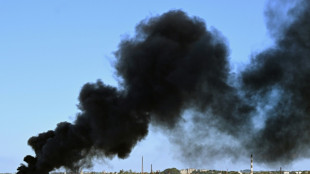
-
 Peru Congress to debate impeachment of interim president on Tuesday
Peru Congress to debate impeachment of interim president on Tuesday
-
Snowboard veteran James targets 2030 Games after Olympic heartbreak

-
 Costa Rica digs up mastodon, giant sloth bones in major archaeological find
Costa Rica digs up mastodon, giant sloth bones in major archaeological find
-
Trump says change of power in Iran would be 'best thing'

-
 Ukrainian skeleton racer Heraskevych loses appeal against Olympic ban
Ukrainian skeleton racer Heraskevych loses appeal against Olympic ban
-
Paris police shoot dead knife man at Arc de Triomphe

-
 Japan's Totsuka wins Olympic halfpipe thriller to deny James elusive gold
Japan's Totsuka wins Olympic halfpipe thriller to deny James elusive gold
-
Canada's PM due in mass shooting town as new details emerge


'Infobesity': How queen coverage could fuel 'news fatigue'
Endless live TV feeds, analysts breathlessly picking apart each gesture, newspapers bursting with commentary: Queen Elizabeth II's death has been covered from every angle by the world's media.
But experts have told AFP that blanket coverage like this may only encourage more people to turn off the news entirely -- deepening the malaise surrounding the industry.
"We're already seeing criticism of the... blanket coverage," said Nic Newman of the Reuters Institute for the Study of Journalism at Oxford University.
This is even more true outside the UK.
"We've all been surprised (by) the extent to which the international media has been interested in a sustained way about the story," he said.
TV stations around the world reported strong viewing figures when the queen's death was announced.
On Twitter, an unprecedented 46.1 million messages on the subject were posted between Thursday and Tuesday, according to the specialist platform Visibrain.
But dissenting voices are growing louder as the coverage continues.
Many social media users complained that the story had in effect pushed every other issue off the agenda.
Paul Barry of Media Watch, a TV show on Australia's ABC public broadcaster, told his viewers that the queen was clearly well liked, before asking: "But did the Australian media really need to go so crazy with the coverage?"
- 'Information fatigue' -
French journalist David Medioni, of the Media Observatory of the Jean-Jaures Foundation in Paris, said the story perfectly illustrated the dilemmas of the modern news industry.
"You can't not cover it, but all the media cover it in the same way," he said.
When the media has exhausted all the angles "you can end up feeling that you haven't heard anything useful or interesting".
Medioni co-led a survey published in early September that investigated "information fatigue", where consumers feel stress and exhaustion at being bombarded by news on multiple platforms.
Some 53 percent of French respondents said they suffered from it.
The Reuters Institute polled people in 40 countries earlier this year and came to a similar conclusion.
Almost four out of 10 respondents said they sometimes deliberately avoided the news when it was depressing, up from 29 percent in 2017.
Almost half (43 percent) said they were put off by the repetitive nature of the news.
Newman, lead author of the report, said it was tricky for the media to keep a story going for days once the initial emotion has passed.
- 'Addictive relationship' -
Medioni is broadly unimpressed with the media's lack of self-reflection when it comes to coverage of events like the queen's death.
But he also suggested the public had an "addictive relationship" with the news, which he labelled "infobesity".
"We have supersized Big Mac meals of news," he said.
"We know it's bad because we feel a form of exhaustion, but we continue to feed on it without knowing how to stop."
He said escaping from this exhaustion was "not just a matter for the media and democracy, it's a matter of public health".
Even those involved in the production of news are not immune.
US journalist Amanda Ripley wrote in a July opinion piece in The Washington Post that she had a "vaguely shameful" secret.
"I've been actively avoiding the news for years," she wrote.
She suggested the media should move away from "outrage, fear and doom" and start "systematically creating news for humans".
E.AbuRizq--SF-PST



